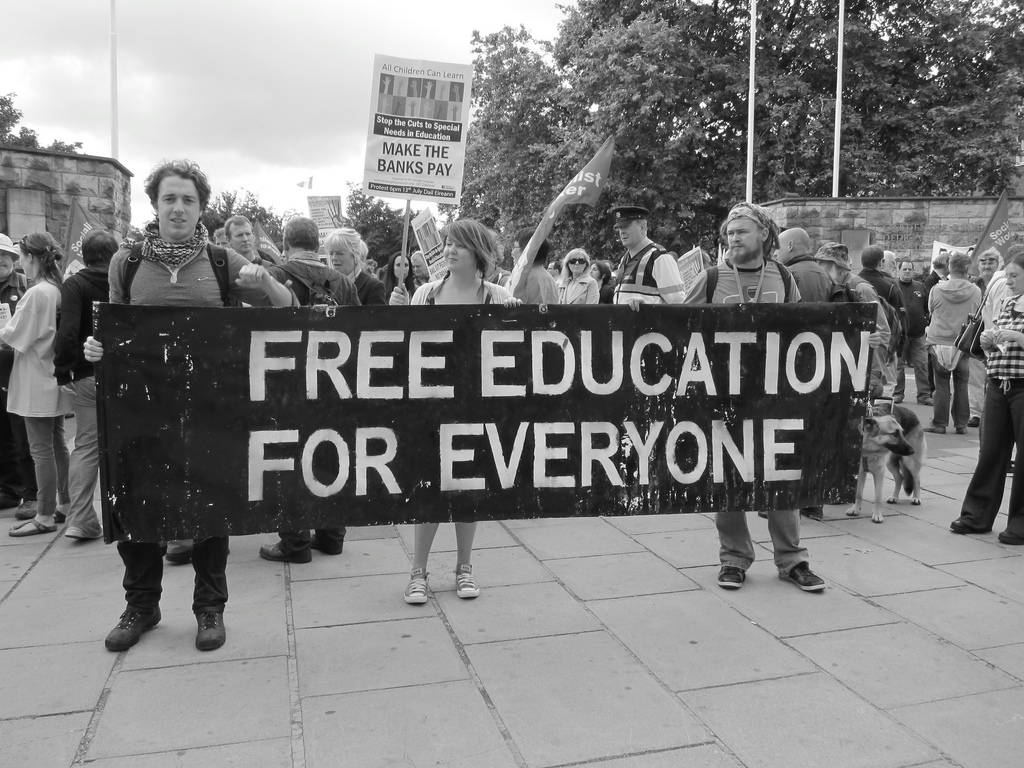
The reorientation of the student movement towards a positive demand for free education brought 10,000 onto the streets in late 2014, and has continued to revitalise campaigns on both a local and a national level.
As one might expect, this emergence of the student movement has led to a mediated response from within parliamentary politics – specifically the Labour party – expressed in a form which seeks to scrap tuition fees within the boundaries of the prevailing austerity consensus.
Labour’s position on university funding has not exactly been clear, despite evidence that its membership supports free education. Amidst the confusion, Shadow Minister for Universities Liam Byrne’s favoured option of a graduate tax seems to gaining prominence. The student movement’s building pressure looks likely to elicit two responses from Labour: firstly, a reduction in tuition fees from £9k to £6k per year (probably in their general election manifesto), and then in the long term a promise to move towards a graduate tax.
A total abolition of tuition fees and the introduction of a graduate tax seems to be more possible than ever. But would it be the end of a campaign for free education?
1. We should be taxing the wealthy, not the educated.
The logic of a graduate tax supposes that every student at university is making an investment in their human capital. This investment is then supposed to pay off when they graduate and move on to a high-paying graduate job. Therefore asking students to pay for their education – either via tuition fees or a graduate tax – makes sense because they are the individual who benefits from their investment in themselves. We could take issue with this on a number of grounds.
The earnings of graduates are at their lowest since 1980 and young people are having to live through an ever growing (if not interminable) period of precarity. We should no longer assume that a university degree leads to a comfortable life. On this basis applying a graduate tax to a graduate without a future seems nonsensical.
2. The graduate tax extends the idea of individualised self-investment.
Under the graduate tax the state acts as a facilitator for individual investment in the education market, supposedly making it easier for young people to develop their entrepreneurial selfhood. This is a progression of the ‘student as consumer’ idea towards ‘student as investor’. A graduate tax doesn’t challenge the underlying neoliberal assault on education, it extends it.
We don’t fund the NHS by taxing the sick, so why should we fund universities by taxing the educated?
3. The repayment threshold could be slashed by up to £11k.
There is currently nothing concrete available on the specifics of Labour’s graduate tax, but it seems reasonable to suppose that if a graduate tax were to be introduced, it would function along the lines suggested by the influential Institute for Public Policy Research (IPPR).
An IPPR report from 2013 recommended a 2% tax for HE graduates on any income over £10k for a period of 40 years, setting the repayment threshold £11k lower than it is for students who enrolled in the current fee regime since 2012.
Last year, an annual salary for someone working for the minimum wage was £13,124. This means that even for those graduates who left university and entered straight into minimum wage employment would pay £62 a year for their education. In other words, a graduate who leaves university and goes into a minimum wage zero-hour contract could be forced to start paying for their degree straight away. Graduates earning substantially below the living wage would be hit hard by any such tax.
Given the general crisis in the cost of living facing young people, this tax would serve only to further impoverish them in the years after graduation, and for the poorest amongst them could serve as a lifelong burden.
4. Free education means living grants.
The cost of education is not simply tuition fees. The average undergraduate racks up £44k of debt over their degree, but only £27k of that is underwriting tuition fees (assuming a three year course at the maximum £9k a year). The remaining £17k comes from the maintenance loan – from the loan you take in order to eat, rent accommodation and so on. This loan itself is often insufficient, as 59% of students have jobs while studying.
Free education doesn’t only mean not paying tuition fees but also being supported in your living costs as you study, so that you don’t have to take on debt in order to live. As long as students are expected to survive on debt, university education cannot be considered meaningfully ‘free’.
5. Free education is about more than the cost of education.
As has been emphasised so often by student campaigners over the last few months, free education does not just mean education without costs.
Issues around immigration, structural oppression, the policing of protest, vice chancellors’ pay, workers’ rights, further education and more are all pivotal to the emerging free education campaign. Fees are a good headline issue, but amongst student campaigners a deeper and more sustained understanding of what freedom means is developing.
A graduate tax is, at best, a rephrasing of the same logic which established tuition fees in the first place. It would reshuffle the burden placed upon students, rather than removing it entirely.
What Labour’s shifting position shows is that the student movement is beginning to assert some power and extract concessions from the political mainstream. Whilst a graduate tax isn’t free education, it shows that students are beginning to create lasting political momentum. If they can form infrastructures and organisations to keep that momentum going, then actual free education seems within reach.